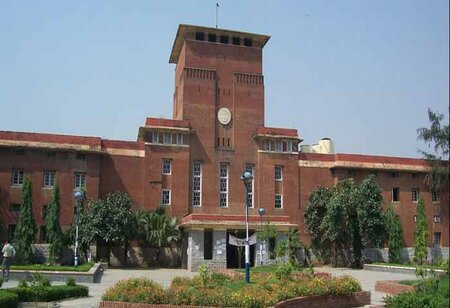Delhi University's Two New Facilitation Centres could be Named after Sushma, Savarkar, Patel
 The Delhi University is aiming to launch two facilitation centres to cater to the needs and requirements of students staying in far-flung areas of Delhi and NCR as the first steps towards starting new colleges. The item is part of the agenda before the Academic Council meeting of the university on Tuesday.
The Delhi University is aiming to launch two facilitation centres to cater to the needs and requirements of students staying in far-flung areas of Delhi and NCR as the first steps towards starting new colleges. The item is part of the agenda before the Academic Council meeting of the university on Tuesday.
The two centres are proposed to be set up in plots of land allotted to the university in Najafgarh and Fatehpur Beri. According to the agenda, these centres are likely to be named after Sushma Swaraj, Swami Vivekananda, V.D. Savarkar or Sardar Patel. These centres will be meant to provide admission and examination related facilities to students of the university in these areas.
On Monday, meanwhile, Delhi University’s Standing Committee on Academic Matters passed the structure for the implementation of the National Education Policy, including a four-year undergraduate programme, from 2022. This means that this will now come under discussion in the university’s Academic Council meeting Tuesday.
Of the 42 members of the committee, three had dissented against the recommendations of the NEP Implementation Committee, stating that detailed feedback had not been sought from all stakeholders on these recommendations and that wider consultation is required before deciding on 2022 as the year to implement the NEP.
The NEP implementation committee had recommended that along with the 3 years Honours degree, the university should assimilate a 4 years Honours degree and 4 years Honours degree with research, with Multiple Entry and Exit Schemes and an Academic Bank of Credit. The dissenters had argued on several points but primarily that the structure will lead to a loss of workload for teachers, and that the multiple exit options and ‘dilution of courses’ will affect the quality of education.
“Experience of FYUP 2013 shows that students rejected the idea of additional expenditure for the fourth year. Survey amongst students (carried in 2013) showed that students were spending close to 1.5 – 2 lakhs per year in staying in Delhi to receive education. Students rejected the idea of FYUP because of the dilution of the first two years of FYUP. We see that the new model once again packs the first two semesters with lukewarm courses. Also there is no promise of grants for the additional year. There will be additional burden on infrastructure. Most colleges do not have any space for further expansion,” said Abha Dev Habib, Treasurer Delhi University Teachers’ Association. The DUTA has called for a strike over this matter.

